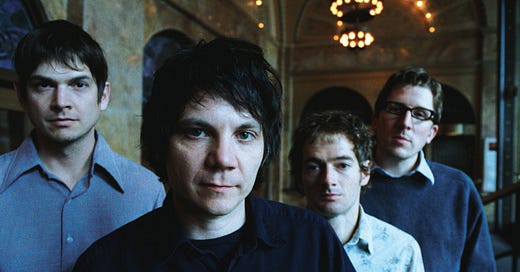Stuff yourself with a heaping helping of Wilco.
The fourth Wilco box set is officially on its way. I dusted-off a bunch of stuff I've written about the band over the years.
Nonesuch Records has just announced a deluxe 20th-anniversary edition of Wilco’s 2004 album A Ghost Is Born (the follow-up to the band’s much-publicized and widely-praised breakthrough effort Yankee Hotel Foxtrot). The 9-CD (or 9-LP/4-CD) set is due for release on February 7, 2025. I preview the new package and offer my thoughts on the original album in the clip above.
The first track the band has shared is an in-progress version of the song “Handshake Drugs”:
In searching for details about the history of the album, I ended up stumbling across my previous Wilco write-ups that are still available online. I’d forgotten about several of them. Here’s a bit from each, along with recommended songs. Spoiler: I regard Wilco bandleader Jeff Tweedy as one of the all-time songwriting greats, but my feelings on his body of work (and on him) are pretty complicated.
For some initial context on the band’s story arc, I’d recommend watching this Pitchfork video from their Liner Notes series:
My Wilco review archive:
Yankee Hotel Foxtrot deluxe edition review, PopMatters (2023)
Few music releases in the 21st century have been enshrouded by legend quite like Wilco‘s Yankee Hotel Foxtrot, which etched its place in pop-culture lore a full seven months prior to its official release in April of 2002. Since then, the drama-rich tale of how Wilco made their fourth proper full-length has been recounted via myriad sources—filmmaker Sam Jones’ documentary I Am Trying to Break Your Heart, veteran music critic Greg Kot’s Wilco biography Learning How to Die, bandleader Jeff Tweedy’s memoir Let’s Go (So We Can Get Back), and countless takes in the press. What else could there possibly be left to learn about an album that’s generated so much commentary in its 20-year lifespan? The answer, as it turns out, is a hell of a lot.
A Ghost Is Born review, The Pitch (2004)
Subtlety is key on Wilco’s follow-up to one of the most acclaimed albums of the past decade. A dramatic departure in tone and texture, A Ghost Is Born courses with a low-grade tension [that simmers in the wake of] lead guitarist Jay Bennett’s departure. Ghost relies more on composition than on the heady atmospherics that so successfully pulled listeners into Yankee Hotel Foxtrot, but it also manages a more understated complexity. Ghost intensifies and slowly unravels with each listen, offering compelling new angles for a band still running full-steam on fresh ideas.
Summerteeth deluxe edition review, Paste (2020)
For all that musicians have spilled their guts about the pitfalls of the rock and roll lifestyle—the usual drugs, excesses, etc—it’s relatively rare to get a window into the toll that success takes on families. In that regard, Wilco’s third album Summerteeth doesn’t offer much, if anything, by way of explicit insights, but it does stand as an affecting example of the anguish that can creep into an artist’s work when that work forces a kind of functional estrangement from home. It was in the crucible of mounting fame, homesickness, anxiety and well-documented substance abuse that Wilco created Summerteeth, an album marked, among other things, by the beguiling contrast between its disquieting lyrics and its mostly sunny musical disposition.
Jeff Tweedy — Warmer review, Paste (2019)
Going all the way back to 1996’s career-defining sophomore opus Being There, Wilco’s tendency to warp, deconstruct, and even outright destroy the core foundation of a song became one of the Chicago band’s calling cards. [Here], the ease of Jeff and Spencer Tweedy’s process allows the listener entry to the music the way a screen door might entice you into a relative’s kitchen that’s filling with the aroma of a meal simmering on the stove. In other words, the mostly barebones, demo-like arrangements on WARM and WARMER offer a straight path to the heart of the songs, even as they invite listeners to imagine all sorts of embellishments that aren’t there, i.e.: touches that Tweedy and his mad-scientist laboratory assistants in Wilco are prone to adding.
Cruel Country review, Holler Country (2022)
…Despite having traversed the United States for the last three decades, certain Cruel Country lyrics suggest that Tweedy still harbors a one-dimensional view of who Americans actually are. [And he] still sees country music across a gulf of understanding he apparently has yet to cross. “I feel a responsibility,” he writes, “to investigate the mirrored problematic natures” of both country music and “the country where I was born”. [But] his presumption that country music is any more “problematic” than other genres comes off as ill-considered and condescending.
Why does Jeff Tweedy's latest critique of America make me uncomfortable?
Recently, I reviewed the new Wilco double album Cruel Country.
Kicking Television — Live in Chicago album review, Rochester City Newspaper (2005)
Wilco's progressive transformation from straightahead country-rock to daring experimentalism almost defies belief. Yet as much as the band is praised for its live show, it still seems challenged to keep the intensity level high for an entire concert. On this double-disc set Wilco avoids the problem by cherry-picking from a four-night engagement. [The band expanded to a six-piece lineup last year], so these new arrangements can sound busy at first. Nonetheless, the gorgeous piano work of Mikael Jorgensen and the powerful presence of new guitarist Nels Cline save the day. Pristine sound quality and a palpable sense of the band really going for it don't hurt. If nothing else, Kicking Television raises the intrigue factor on the question of where Wilco will go next.
Quindar (Mikael Jorgensen) — Hip Mobility review, Pitchfork (2017)
The one album where Jorgensen showcased his innate touch with a hook—2009’s All Is Golden, released under the name Pronto—flew almost completely under the radar. Pronto isn’t even listed among the numerous projects that get the spotlight on Jorgensen’s website. All Is Golden’s droll AM-inspired indie rock remains lost in the shuffle, along with the compositional acumen that went into its making. [By contrast, Hip Mobility, which was] constructed around archival NASA recordings, contains no singing at all. [This proves to be] quite unfortunate because, this time, Jorgensen outdoes himself, sustaining a level of majesty with his sounds from the very first note.
FYI, I’m digging this album a lot more now than I did at the time, and I would also highly recommend the Pronto album, streaming/available on Bandcamp:
Jeff Tweedy — Sunken Treasure review, Rochester City Newspaper (2006)
Fans drawn to Wilco’s exquisite sense of layering and group interplay might be shocked to see just how much of the information in songwriter Jeff Tweedy’s creations translates to [mere] acoustic guitar and voice. Sunken Treasure follows Tweedy over the course of five West Coast shows, drawing interviews, stage raps, and, of course, songs from each. Aside from the disarming openness Tweedy shows in both the music and his monologues, the filmmakers strike gold by presenting the footage in a segmented, night-by-night structure. Without Wilco’s funnel-cloud noise swirling around him, Tweedy appears achingly bare—not to mention vulnerable—on his own. He instills intense affection [from fans], and these knockout performances make it easy to see why.
Uncle Tupelo — No Depression, Paste’s Best Albums of 1990 (2020)
Compared to the experimentation we would later expect from Uncle Tupelo co-founder Jeff Tweedy as the leader of Wilco, Uncle Tupelo’s debut effort No Depression brims with an almost childlike naiveté. Listening to Tweedy, bandleader/main songwriter Jay Farrar and drummer Mike Heidorn tear through their countrified take on punk, the exuberance in the performances is so striking, it’s as if you’re listening to the sound of your own youth whooshing by in a flash. Mixing punk with country was hardly new when Uncle Tupelo caused a sensation with their signature hybrid of the two forms—cowpunk acts like The Blasters, Rank and File, Rubber Rodeo and The Meat Puppets had blazed that trail a decade earlier—but production courtesy of then-upstart alternative-rock producers Paul Q. Kolderie and Sean Slade helped position Uncle Tupelo within the zeitgeist. Truth be told, Uncle Tupelo sometimes skirted the edge of condescension with their exaggerated hillbilly affectations. That said, there’s no denying the realness in this album’s undercurrent of Midwest small-town hopelessness. Decades later, it’s easy to see why No Depression inspired both the movement and the magazine that bear its name.
And here’s Wilco bassist John Stirratt, from the liner notes of the 2017 reissue of Wilco’s debut album A.M.:
“Listening back to records 15 to 20 years later, I’m always taken with the confident but guileless quality of bands in their 20s, that strange mixture of innocence and conviction, and this is one of those records—we were barely a band at that point, just trying to make some noise.”
Also:
Feature story/interview with Stirratt, Mountain Xpress (2005)
Feature story/interview w/ longtime lead guitarist Nels Cline, Anchorage Press (2008)
Might as well throw this in too:
<3 SRK




